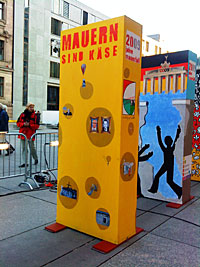
The Institute for Cultural Diplomacy took the occasion to organize a conference with the adequate title “A World Without Walls – An International Congress on “Soft Power,” Cultural Diplomacy and Interdependence.”
Renowned figures from international politics and academia reflected on the development of international relations since 1989, the challenges faced by the leaders of the future, and the growing influence of cultural diplomacy and “soft power” in the contemporary political international environment.
The conference started with the keynote speech of Professor Benjamin Barber, famous for books such as Jihad versus McWorld and Strong Democracy. Describing himself as a “popstar,” he outlined his critical views on capitalism and consumerism.
When coming to walls, he mentioned that no one back in the 70s could imagine a fall of the Berlin Wall ever. Still, it was possible, and it should be possible for the other walls still existing or newly built all over the world as well: Between Israel and Palestine, between the US-Mexican border, gated communities as borders within countries and finally borders in our minds. A wall can never be the solution, Barber concluded.
He added the example of immigrants. As long as people wanted to enter America because there are jobs, they will always find a way, even if it becomes more difficult. In the afternoon the different views on this topic became obvious. Meir Shlomo, the Strategic Adviser of the Public Diplomacy Division of the Foreign Affairs Ministry of Israel, outlined Israel’s strategy to promote a more positive picture in the world. He clearly answered a question from the audience regarding the wall between Israel and Palestine: It helped to keep terrorists out, and that means it’s necessary.
In order to understand the others, or “outsiders,” behind a wall, a key element is to listen and to see. Arts play an important role in this process. The US photographer Anthony Suau, 1984 Pulitzer Prize winner, gave the fall of the Berlin Wall a face.
He showed a selection of his impressive pictures he took on 9 November 1989 at the Wall, some of which were widely published. His project “Beyond the Fall” shows that his understanding of this event is going deeper. He traveled widely throughout former Soviet Union before and after the fall of the Wall and the Iron Curtain as a whole. In this project he documented the enormous challenges and changes these countries faced after 1989.
Understanding can be reached by attracting the other, with arts for example, as mentioned. Soft power should not be used by Ssates only, but by all actors in international politics, such as NGOs or international institutions. Martin Hope from the British Council showed how effective this could be. To support intercultural dialogue the Council invests in long term, multilateral programs such as “Global Change Makers.” There, grassroots and young activists from all over the world get support and are brought together in a network where they can learn from each other.
Hope gave an impressive overview of the impact soft power can have. For him, it is evident that understand others thinking leads to more security. Let’s hope that more people, especially from the governments, will see it the same way too.

